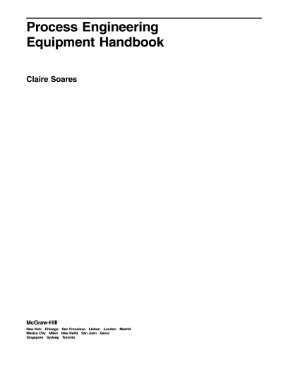McGraw-Hill, 2002. – 978 p.
This book contains information on the major components and basic systems, including instrumentation and controls, and some optimization techniques that I wish I had had when I landed, albeit happily, in my first major plant. It also contains examples, drawn from knowledgeable sources, of action plans that have kept various process companies in good standing and high esteem with their public and govements worldwide. Selected extracts of the technology that are the bases of these policies are also included. These examples and technology extracts are frequently missing from engineering handbooks; I would be doing users of this handbook a disservice to leave out this information.
Increasingly process plants are becoming small power producers. Govements are now beginning to offer incentives to small power producers. The Thai govement, which buys the excess power from Esso's Sriracha refinery, is just one such example. The Alberta, Canada, govement buys excess power from Syncrude Canada Limited, which produces 170,000 barrels of crude oil a day. The British power network buys excess power from Elf Acquitaine's Flotta terminal, which collects North Sea petroleum products.
In other words, this book aims to provide a process engineer with:
? Knowledge of the basics the process engineer will meet up with
? Enough knowledge to help the process engineer optimize operation safety, efficiency, and profit margins
? Information about environmental systems and avoiding trouble with the law
? Tools to integrate the plant's operation with other services, such as power production and waste management, to further optimize profits and minimize losses due to interruptions in services provided by exteal companies
This book contains information on the major components and basic systems, including instrumentation and controls, and some optimization techniques that I wish I had had when I landed, albeit happily, in my first major plant. It also contains examples, drawn from knowledgeable sources, of action plans that have kept various process companies in good standing and high esteem with their public and govements worldwide. Selected extracts of the technology that are the bases of these policies are also included. These examples and technology extracts are frequently missing from engineering handbooks; I would be doing users of this handbook a disservice to leave out this information.
Increasingly process plants are becoming small power producers. Govements are now beginning to offer incentives to small power producers. The Thai govement, which buys the excess power from Esso's Sriracha refinery, is just one such example. The Alberta, Canada, govement buys excess power from Syncrude Canada Limited, which produces 170,000 barrels of crude oil a day. The British power network buys excess power from Elf Acquitaine's Flotta terminal, which collects North Sea petroleum products.
In other words, this book aims to provide a process engineer with:
? Knowledge of the basics the process engineer will meet up with
? Enough knowledge to help the process engineer optimize operation safety, efficiency, and profit margins
? Information about environmental systems and avoiding trouble with the law
? Tools to integrate the plant's operation with other services, such as power production and waste management, to further optimize profits and minimize losses due to interruptions in services provided by exteal companies

